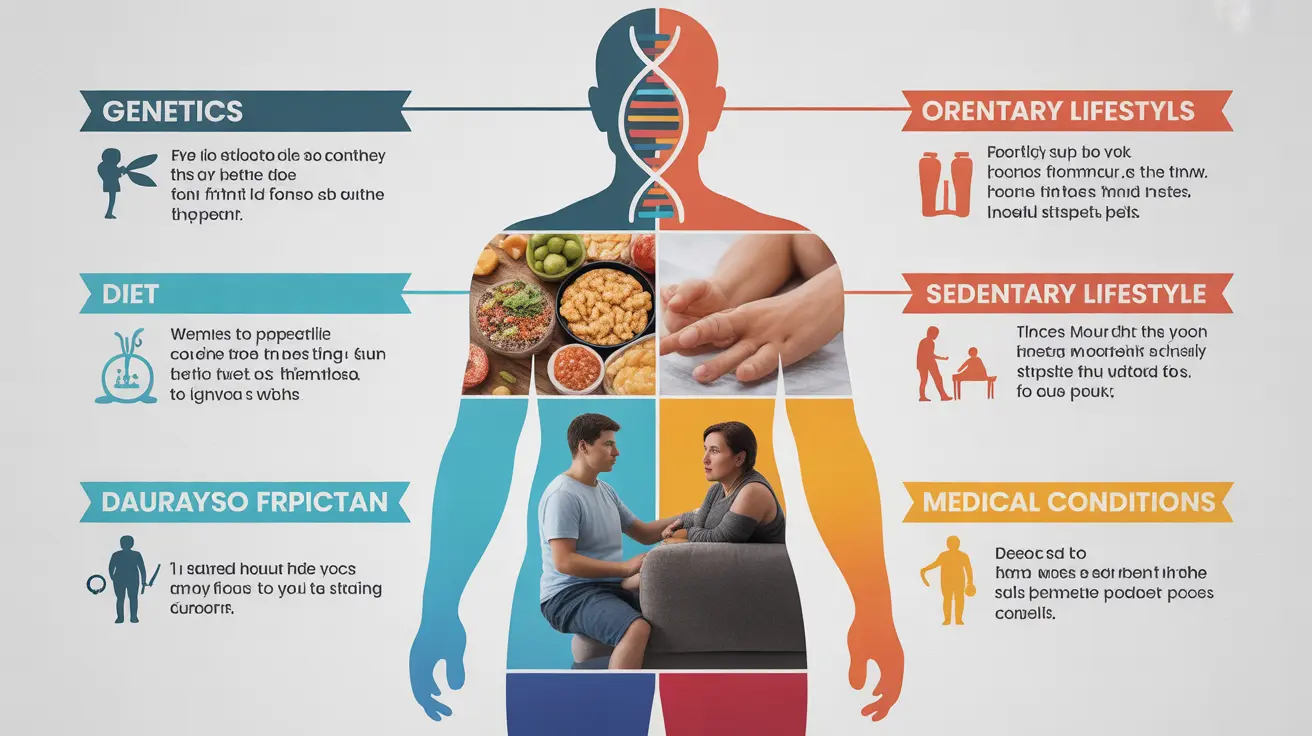Obesity has become a significant global health concern, affecting millions of people worldwide. Understanding the various risk factors that contribute to obesity is crucial for both prevention and management of this complex condition. This comprehensive guide explores the key factors that increase the likelihood of developing obesity and provides insights into effective management strategies.
Genetic and Biological Factors
Genetics play a significant role in determining an individual's susceptibility to obesity. Research shows that inherited genes can influence body weight regulation, fat distribution, and how efficiently the body converts food into energy. However, genetic predisposition doesn't necessarily mean obesity is inevitable – lifestyle choices remain crucial in managing weight.
Several biological factors can also impact weight gain:
- Hormonal imbalances
- Metabolic rate variations
- Age-related changes in body composition
- Gender-specific factors affecting fat distribution
Medical Conditions and Medications
Certain health conditions can significantly increase the risk of developing obesity. These include:
- Hypothyroidism
- Polycystic ovary syndrome (PCOS)
- Cushing's syndrome
- Prader-Willi syndrome
Additionally, various medications can contribute to weight gain, particularly:
- Antidepressants
- Antipsychotic medications
- Steroids
- Beta-blockers
- Insulin and certain diabetes medications
Dietary and Lifestyle Risk Factors
Diet plays a crucial role in obesity development. Modern eating habits that contribute to weight gain include:
- High consumption of processed foods
- Excessive intake of added sugars
- Regular consumption of sugar-sweetened beverages
- Large portion sizes
- Irregular eating patterns
Physical Activity and Sedentary Behavior
A sedentary lifestyle significantly increases obesity risk. Common contributing factors include:
- Desk-bound jobs
- Extended screen time
- Limited physical activity
- Poor sleep habits
- High stress levels
Environmental and Social Factors
Environmental and social circumstances can significantly impact obesity risk:
- Limited access to healthy food options
- Food insecurity
- Socioeconomic status
- Cultural dietary practices
- Social support networks
- Work schedules and stress levels
Prevention and Management Strategies
Effective obesity prevention and management typically involves multiple approaches:
- Regular physical activity
- Balanced, nutritious diet
- Adequate sleep
- Stress management
- Regular health check-ups
- Building support systems
Frequently Asked Questions
What are the main risk factors that contribute to obesity, and how can they be managed?
The main risk factors include genetics, medical conditions, medications, poor dietary habits, sedentary lifestyle, and environmental factors. Management strategies include maintaining a balanced diet, regular exercise, adequate sleep, stress management, and working with healthcare providers to address underlying medical conditions.
Can certain medications, such as antidepressants, cause weight gain and obesity?
Yes, certain medications, including some antidepressants, antipsychotics, steroids, and diabetes medications, can contribute to weight gain. If you're concerned about medication-related weight gain, consult your healthcare provider about potential alternatives or management strategies.
How does a diet high in processed foods and added sugars impact the risk of developing obesity?
Processed foods and added sugars often contain high calories with little nutritional value, leading to excessive calorie intake while failing to provide satiety. These foods can disrupt natural hunger signals and contribute to inflammation and metabolic changes that promote weight gain.
What are some lifestyle changes that can help prevent or reduce the risk of obesity?
Key lifestyle changes include adopting a balanced, whole-food diet, engaging in regular physical activity, ensuring adequate sleep, managing stress effectively, limiting screen time, and maintaining regular meal patterns.
Are there any specific health conditions, such as polycystic ovary syndrome, that increase the likelihood of obesity?
Yes, several health conditions can increase obesity risk. PCOS, hypothyroidism, Cushing's syndrome, and hormonal disorders can affect metabolism and weight regulation. Managing these conditions through medical treatment and lifestyle modifications is essential for weight management.




